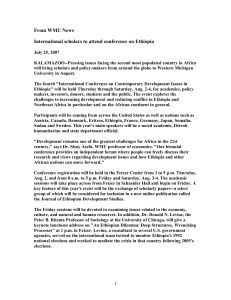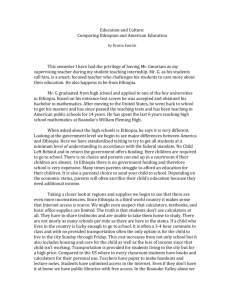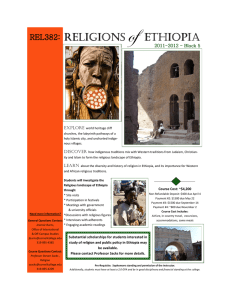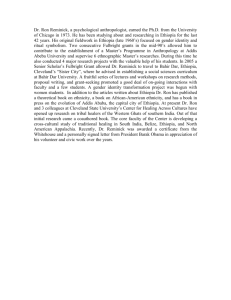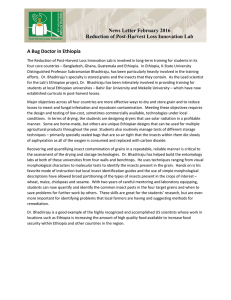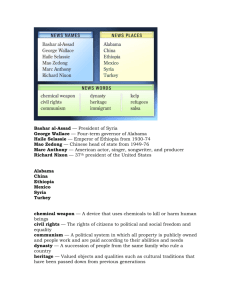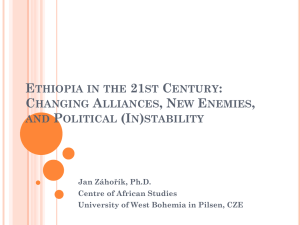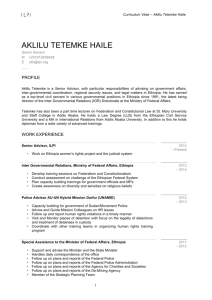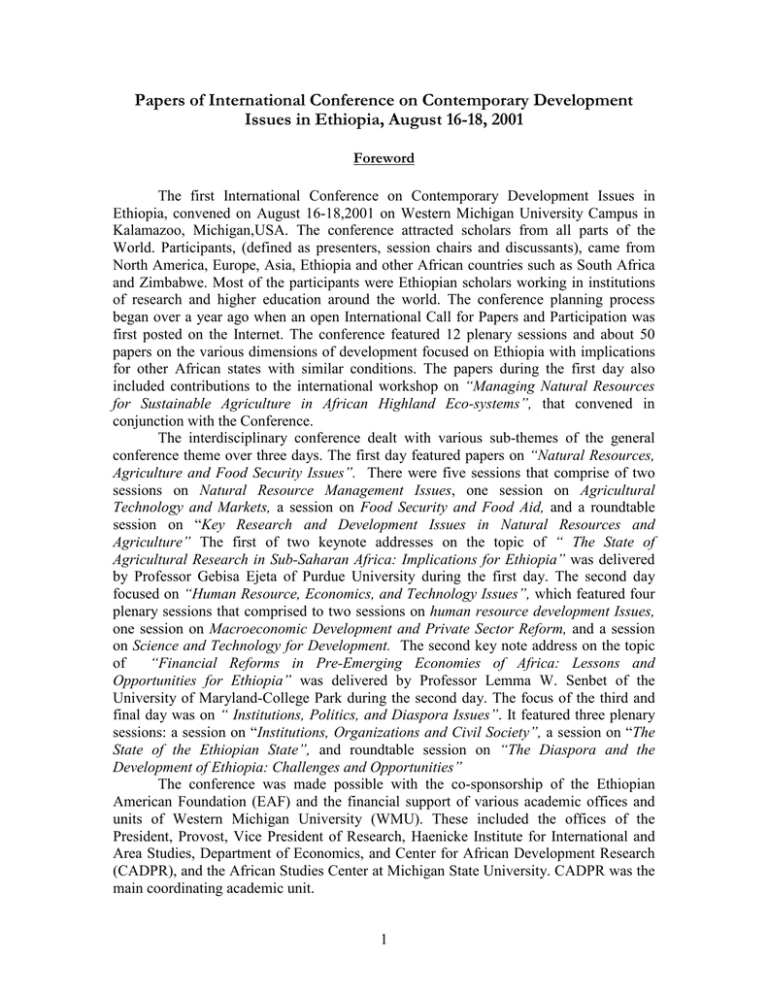
Papers of International Conference on Contemporary Development
Issues in Ethiopia, August 16-18, 2001
Foreword
The first International Conference on Contemporary Development Issues in
Ethiopia, convened on August 16-18,2001 on Western Michigan University Campus in
Kalamazoo, Michigan,USA. The conference attracted scholars from all parts of the
World. Participants, (defined as presenters, session chairs and discussants), came from
North America, Europe, Asia, Ethiopia and other African countries such as South Africa
and Zimbabwe. Most of the participants were Ethiopian scholars working in institutions
of research and higher education around the world. The conference planning process
began over a year ago when an open International Call for Papers and Participation was
first posted on the Internet. The conference featured 12 plenary sessions and about 50
papers on the various dimensions of development focused on Ethiopia with implications
for other African states with similar conditions. The papers during the first day also
included contributions to the international workshop on “Managing Natural Resources
for Sustainable Agriculture in African Highland Eco-systems”, that convened in
conjunction with the Conference.
The interdisciplinary conference dealt with various sub-themes of the general
conference theme over three days. The first day featured papers on “Natural Resources,
Agriculture and Food Security Issues”. There were five sessions that comprise of two
sessions on Natural Resource Management Issues, one session on Agricultural
Technology and Markets, a session on Food Security and Food Aid, and a roundtable
session on “Key Research and Development Issues in Natural Resources and
Agriculture” The first of two keynote addresses on the topic of “ The State of
Agricultural Research in Sub-Saharan Africa: Implications for Ethiopia” was delivered
by Professor Gebisa Ejeta of Purdue University during the first day. The second day
focused on “Human Resource, Economics, and Technology Issues”, which featured four
plenary sessions that comprised to two sessions on human resource development Issues,
one session on Macroeconomic Development and Private Sector Reform, and a session
on Science and Technology for Development. The second key note address on the topic
of
“Financial Reforms in Pre-Emerging Economies of Africa: Lessons and
Opportunities for Ethiopia” was delivered by Professor Lemma W. Senbet of the
University of Maryland-College Park during the second day. The focus of the third and
final day was on “ Institutions, Politics, and Diaspora Issues”. It featured three plenary
sessions: a session on “Institutions, Organizations and Civil Society”, a session on “The
State of the Ethiopian State”, and roundtable session on “The Diaspora and the
Development of Ethiopia: Challenges and Opportunities”
The conference was made possible with the co-sponsorship of the Ethiopian
American Foundation (EAF) and the financial support of various academic offices and
units of Western Michigan University (WMU). These included the offices of the
President, Provost, Vice President of Research, Haenicke Institute for International and
Area Studies, Department of Economics, and Center for African Development Research
(CADPR), and the African Studies Center at Michigan State University. CADPR was the
main coordinating academic unit.
1
A team from the WMU office of Conferences and Seminars provided an outstanding
service in managing the implementation of the Conference.
The conference was a partnership academic event of WMU and EAF. EAF is a
non-profit and non-partisan organization registered in the State of Michigan. It is a
membership organization whose aim is to support and enhance higher education and
development in Ethiopia by bringing to bear the collective effort of Ethiopians, Ethiopian
Americans, and American friends of Ethiopia.
The conference was motivated by the belief that development and poverty
alleviation is the greatest challenge for Ethiopia in particular and for Africa in general for
the 21st century. Ethiopia with a population of over 60 million people is the second most
populated country in Sub-Saharan Africa. It is an important African state, which
historically took a key leadership role in the de-colonization of Africa and in fostering
unity among African States. It was a co-founder in 1963 and is current home of the
Organization of African Unity (OAU), which is aimed at promoting economic unity
among African states. Ethiopia is also home to important international and pan-African
institutions such as United Nations Economic Commission for Africa (UNECA).
Development in the conference is viewed as a multi-dimensional process that
requires interdisciplinary approach. It is a process that leads to the improvement of the
quality of human life by providing access to resources, employment, income, education
and health services. Development also includes the human need for freedom of
expression and mobility of people and resources in search of opportunity, and the critical
need for the institutional framework that makes this process possible. The conference was
based on the belief that development policy can be greatly improved and informed by
objective examination of current realities and their historical evolution in Ethiopia, as
well as the comparative experiences of other developing countries that have succeeded in
alleviating poverty and achieving unity within diversity. The challenge of development in
Ethiopia and in many African states is the alleviation of poverty and the achievement of
peaceful and democratic unity with diversity. The conference provided an academic
forum of free expression of ideas aimed at the various dimensions of development.
In the views of many participants, the conference was regarded as a huge success.
Some of the contributing features to it’s success included the following: First, it brought
together some of the best studies on Ethiopian development issues across disciplines
through an open International Call for Papers and presentations. No attempt was made to
pre-select participants or pre-determines the agenda or it’s outcome. Second, It was
inclusive. It provided an independent and free forum, not captured by partisan politics, by
attracting Ethiopian and other scholars and/or professionals across ethnicity and political
views to engage in a healthy and constructive discussion. Conference participants are
those who have answered our open Call for Papers and Presentations. It is not easy to
bring such a diverse group for constructive dialogue, as those who follow contemporary
Ethiopian affairs may be aware. But, we believe the Conference managed to do so. It
lived up to the very spirit of EAF, as an independent and non-partisan organization.
Third, the conference passed no resolutions since this was not it’s intent. But, it was
evident at it’s conclusion that it raised a fresh level of energy and commitment among
participants to hold future such conferences and to engage in constructive dialogue on
development issues. Finally, it was efficiently guided and managed in a friendly
environment.
2
The comments and evaluations received by e-mail from participants have been
very positive. The following are typical of the comments made by some of the
participants:
Dr. Assegedech Hailemariam of Eastern Illinois University noted, “ You did a
fantastic job, and your staff was unbelievably helpful. I had an awakening experience and
a sense of recommitment that we can help facilitate a positive change in our beloved
country”. I felt proud that we have made something of ourselves, and that we did not
leave our country for nothing. The diversity of fields and participants represented was
impressive”
Professor Teshome Wagaw of the University of Michigan-Ann Arbor noted, “
You should be commended highly for having devoted so much thought and energy in
bringing the conference to such height. Western Michigan University and its leadership
should be commended for their generosity in making their facilities available. Please
convey this sentiment to them once more on our behalf”
Professor Evelyne Cudel of Michigan State University wrote, “ I want to thank
you so much for putting together this great conference. It was such a success for all of us.
The primary objectives of the conference as they were described in the announcement
have been outstandingly fulfilled”.
Dr. Berhanu Gebremedhin of International Livestock Research Institute (ILRI),
Addis Ababa, Ethiopia commented “…..This is my first time see such a diverse group
deliberate in such a civilized manner, at least during the last 10 years”
Dr. Abebe Kebede of North Carolina A & T and State University in his
“Reflections on Kalamazoo Conference” posted on the Internet writes “…I had an
opportunity to meet so many great thinkers and to reflect on the potential for a true
development of Ethiopia. …For me the thought of not seeing many of these colleagues
again has put me into a sad mood. I want to tell them everything, I ran out of time and
out of words. I am looking forward for a similar gathering. I hope and pray that I will see
them again.”
Dr. Habte Woldu of the University of Dallas, Texas commented, “ Indeed, it was
a great conference and I would like to congratulate you for the success and the quality of
papers as well as for creating a friendly but merit based academic conference”
Dr. Brook Hailu of the Embassy of Ethiopia wrote, “ I cannot congratulate you
enough for the success of the event where Ethiopian professionals such as yourself had
the opportunity to discuss development issues in our country”
Dr.Helmut Kloos of the University of California, San Francisco wrote, “ I want to
thank you for organizing the Conference, which I greatly enjoyed since it presented new
ideas and data and also gave me a chance to meet some old friends and colleagues and
make new friends”
Professor Assefa Mehretu of Michigan State University in a letter addressed to
WMU President wrote, “ I would like to thank you individually and your institution in
general for having hosted one of the best conferences I have been to in my long academic
career. ……Overall, this was tremendously successful conference which has established
a standard by which others will be measured”.
The above is a selected sample. There were several other participants who made
equally positive comments both orally and in writing. Conference evaluations also
included some critically constructive suggestions and comments for the next conference.
3
These included suggestions such as the need to extend the time allowed for presentations,
the need to go beyond the academic community and include development practitioners
from the non-governmental organization (NGOs) and business communities. These and
other suggestions will be considered in the planning process of the next conference.
This three-volume proceedings contains 52 papers contributed to the conference.
Most of the papers in the proceedings were presented in the various sessions of the
conference, but a few of the papers were contributed in absentia.
The papers are included in the proceedings as presented by the author(s). They are
classifed into three volumes as follows: Part I: Agriculture, Environment and Food
Security Issues; Part II: Economics, Human Resources, and Technology Issues, Part III:
Governances, Institutions, Politics, and Diaspora Issues. Volume I contains 20 papers
classified into three sub-themes, Volume II contains 22 papers classified into three subthemes, and Volume III contains 10 papers classified into two sub-themes, as shown on
the page that follows this foreword.
I want to acknowledge the financial support of the various co-sponsoring
academic offices and departments of Western Michigan University listed earlier in this
introduction , and thank all conference participants (presenters, chairs, and discussants)
without whom the conference would not have been possible. I am also thankful to the
members of EAF Executive Committee for their cooperation and support during the
conference planning period. My Special thanks must go to Dr. Tesfaye Teklu for his
intellectual contribution in the conference planning process in general, and for his
substantial role in organizing the sessions during the first day of the conference in
particular. I also want acknowledge the valuable assistance provided during the
conference planning process by Ms. Rena Lynema, Administrative Assistant at the WMU
Haenicke Institute of International and Areas Studies.
Finally, the EAF Board has committed itself to undertake such a conference on a
bi-annual basis. At it’s recent meeting of September 29, 2003 in Canton, Michigan, the
Board decided to convene the Second International Conference on Contemporary
Development Issues on August 1-2, 2003. The Board discussed alternative venue options
for the next conference, and decided to hold the second bi-annual conference at Western
Michigan University. The EAF Board, however, agreed to explore the idea of holding the
Third International Conference in Ethiopia in 2005.
Professor Sisay Asefa, Program Chair
International Conference on Contemporary Development Issues in Ethiopia, August 16-18, 2001
(November 2001)
--------------------The full-text proceedings and papers collected within have been reproduced exactly as
their author(s) submitted them. All rights reserved by the author(s). No part of this
collection may be reproduced or utilized in any form by any means without written
permission.
©: 2001 by Westen Michigan University
4


